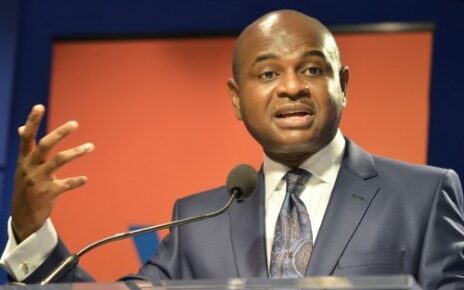The Debt Management Office (DMO) on Thursday disclosed that the nation’s debt stock totalled N24.38 trillion as at the end of the 2018 fiscal year, representing N2.66 trillion or 12.25 percent higher than the N21.74 trillion in the preceding year.
The Director-General of the Office, Ms Patience Oniha, disclosed the figures during a media briefing on the state of the nation’s debt level as at end-year 2018.
She clarified: “Further details provided in the report showed that more progress was made towards achieving the target Debt Stock mix of 60 per cent (Domestic) and 40 per cent (External).
“The share of domestic debt dropped to 68.18 per cent from 73.36 per cent as at Dec. 31, 2017 thereby achieving a mix of 68.18 per cent and 31.82 per cent in the debt stock”, Oniha added.
Giving further analysis of the debt stock based on national and sub-national liabilities, she said the Federal Government loans accounted for 78 percent of the total indebtedness and that the states and the FCT accounted for the balance of 22 percent.
According to her, as at the end of the review period, Federal Government’s external debt stock stood at N6.4 trillion compared to the domestic stock of N17.11 trillion.
Oniha said that the Federal Government’s domestic debt stock includes N331.12 billion Promissory Notes issued to oil marketing companies and state governments in December 2018
The debt management expert put the states’ and the FCT’s external debt stock at N1.25 trillion and domestic debt at N3.85 trillion, totalling N5.15 trillion.
Speaking further on the agency’s debt management strategy, she pointed out that the strategy of using relatively cheaper and longer tenor external funds was achieving the desired fiscal objectives, including the creation of more space for other borrowers in the domestic market and extension of the average tenor of the debt stock in order to reduce refinancing risk and increase external reserves.
Oniha explained further that the implementation of the strategy led to an injection of N855 billion through the redemption of Nigerian Treasury Bills (NTBs) in 2018, leading to a reduction of Federal Government’s borrowing rate in the domestic market from over 18 percent in 2017 to between 14 and 15 percent per annum in 2018.
She disclosed that that some of the strategic plans of the Office in 2019 were to undertake more of project-tied borrowing and access more external borrowing from concessional sources.
In addition, the Director General said that there plans were being made by the DMO to issue 30-year Federal Government Bonds for the first time this year to meet the needs of annuity and those of long term investors.
She said: “The issuance of the bond will meet the needs of annuity funds and other long term investors while also developing the domestic capital market and reducing the re-financing risk of the Federal Government.
“Another area of focus will be the management of risks associated with the debt stock to mitigate debt service costs”, Oniha added.
On the level of borrowing in the 2019 fiscal year, the Director General explained that as already captured in the 2019 budget proposal now before the National Assembly, the Federal Government would borrow N1.6 trillion to finance the budget deficit.
She said that of the amount, N824 billion would be borrowed domestically through Federal Government Bonds, Sukuk, Green Bonds and Savings Bonds while the other N824 billion would be sourced from the external market from concessional sources.
Oniha said that the proposed N15 billion Green Bonds and the infrastructure bonds would be issued in the second quarter of this year.



